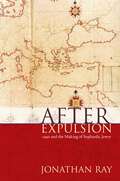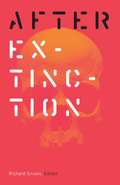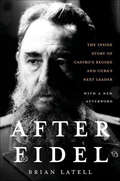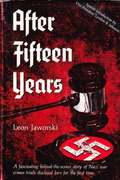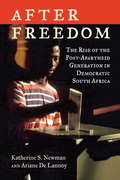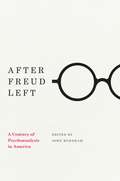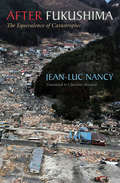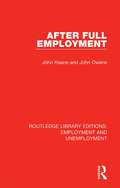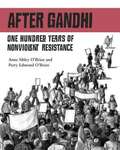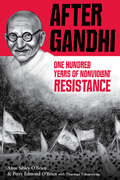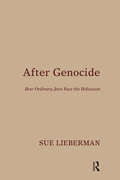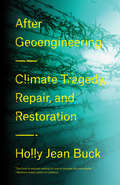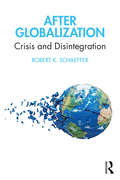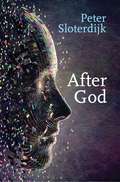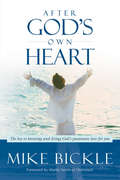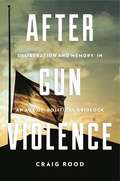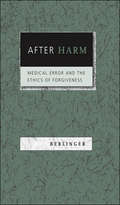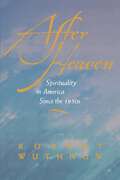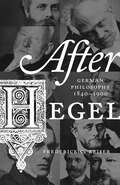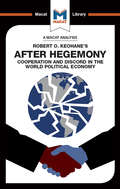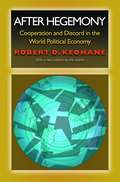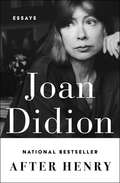- Table View
- List View
After Expulsion: 1492 and the Making of Sephardic Jewry
by Jonathan S RayA &“groundbreaking&” portrait of the migration and resettlement of Spain&’s Jewish community after 1492, and how the Sephardic identity emerged (American Historical Review). Honorable Mention, Jordan Schnitzer Book Award in Medieval and Early Modern Jewish History presented by the Association for Jewish Studies On August 3, 1492, the same day that Columbus set sail from Spain, the long and glorious history of that nation&’s Jewish community officially came to a close. The expulsion of Europe&’s last major Jewish community ended more than a thousand years of unparalleled prosperity, cultural vitality, and intellectual productivity. Yet, the crisis of 1492 also gave rise to a dynamic and resilient diaspora society spanning East and West. After Expulsion traces the various paths of migration and resettlement of Sephardic Jews and Conversos over the course of the tumultuous sixteenth century. Pivotally, the volume argues that the exiles did not become &“Sephardic Jews&” overnight. Only in the second and third generation did these disparate groups coalesce and adopt a &“Sephardic Jewish&” identity. This is a new and fascinating portrait of Jewish society in transition from the medieval to the early modern period—a portrait that challenges many longstanding assumptions about the differences between Europe and the Middle East. &“A rich and compelling history . . . With its intense focus on one century, Ray&’s book makes a distant time and trauma painfully vivid and immediate to the reader.&” ―Jewish Currents Magazine
After Extinction (21st Century Studies #6)
by Ashley Dawson Joseph Masco William E. Connolly Jussi Parikka Cary Wolfe Nicholas Mirzoeff Margaret Noodin Bernard C. Perley Claire Colebrook Joanna Zylinska Daryl BaldwinA multidisciplinary exploration of extinction and what comes next What comes after extinction? Including both prominent and unusual voices in current debates around the Anthropocene, this collection asks authors from diverse backgrounds to address this question. After Extinction looks at the future of humans and nonhumans, exploring how the scale of risk posed by extinction has changed in light of the accelerated networks of the twenty-first century. The collection considers extinction as a cultural, artistic, and media event as well as a biological one. The authors treat extinction in relation to a variety of topics, including disability, human exceptionalism, science-fiction understandings of time and posthistory, photography, the contemporary ecological crisis, the California Condor, systemic racism, Native American traditions, and capitalism.From discussions of the anticipated sixth extinction to the status of writing, theory, and philosophy after extinction, the contributions of this volume are insightful and innovative, timely and thought provoking. Contributors: Daryl Baldwin, Miami U; Claire Colebrook, Pennsylvania State U; William E. Connolly, Johns Hopkins U; Ashley Dawson, CUNY Graduate Center; Joseph Masco, U of Chicago; Nicholas Mirzoeff, New York U; Margaret Noodin, U of Wisconsin–Milwaukee; Jussi Parikka, U of Southampton; Bernard C. Perley, U of Wisconsin–Milwaukee; Cary Wolfe, Rice U; Joanna Zylinska, Goldsmiths, U of London.
After Fidel: The Inside Story of Castro's Regime and Cuba's Next Leader
by Brian LatellThis is a compelling behind-the-scenes account of the extraordinary Castro brothers and the dynastic succession of Fidel's younger brother Raul. Brian Latell, the CIA analyst who has followed Castro since the sixties, gives an unprecedented view into Fidel and Raul's remarkable relationship, revealing how they have collaborated in policy making, divided responsibilities, and resolved disagreements for more than forty years--a challenge to the notion that Fidel always acts alone. Latell has had more access to the brothers than anyone else in this country, and his briefs to the CIA informed much of U.S. policy. Based on his knowledge of Raul Castro, Latell makes projections on what kind of leader Raul will be and how the shift in power might influence U.S.-Cuban relations.
After Fifteen Years
by Leon JaworskiA Fascinating Behind-The-Scenes Story Of Nazi War Crimes Trials Disclosed Here For The First TimeLeon Jaworski was a prodigal lawyer, the youngest person ever to be admitted to the Texas Bar and was involved in some of the important cases in legal history. His enduring fame came from leading the prosecution of the Watergate case, United States v Nixon, and heading the large Texas based law firm Fulbright and Jaworski.Jaworski wrote a number of autobiographical books, in this, his first volume of memoirs, he reflects on his wartime career during which he served in the United States Army judge advocate general's department . He was made chief of the trial section of the war crimes branch in the late stages of the war in Europe. In this office he directed investigations of several hundred cases concerning German crimes against persons living and fighting in the American zone of occupation. He also personally tried two cases--the first having to do with the murder of American aviators shot down over Germany in 1944 and the second involving the doctors and staff of a German sanatorium where Polish and Russian prisoners were put to death. Jaworski had risen to the rank of colonel by the time he returned to civilian life in October 1945.
After Freedom
by Katherine S. Newman Ariane De LannoyTwenty years after the end of apartheid, a new generation is building a multiracial democracy in South Africa but remains mired in economic inequality and political conflict. This spring, South Africa will celebrate the twentieth anniversary of the fall of apartheid and the first free elections. Although the country has come far, frustration is growing as inequalities that once divided the races now grow within them. In After Freedom, award-winning sociologist Katherine S. Newman and South African expert Ariane De Lannoy profile seven people--Black, White, "Coloured," and immigrant--to reveal what life is like in South Africa today. These on-the-ground portraits offer an intimate look at the rising generation of young people and explore what the complex political landscape means to the average person. After Freedom is a timely look at how the generation that came of age post-apartheid is grappling with a tenuous democracy in a globalized economy.
After Freud Left: A Century of Psychoanalysis in America
by John BurnhamFrom August 29 to September 21, 1909, Sigmund Freud visited the United States, where he gave five lectures at Clark University in Worcester, Massachusetts. This volume brings together a stunning gallery of leading historians of psychoanalysis and of American culture to consider the broad history of psychoanalysis in America and to reflect on what has happened to Freud’s legacy in the United States in the century since his visit There has been a flood of recent scholarship on Freud’s life and on the European and world history of psychoanalysis, but historians have produced relatively little on the proliferation of psychoanalytic thinking in the United States, where Freud’s work had monumental intellectual and social impact. The essays in After Freud Left provide readers with insights and perspectives to help them understand the uniqueness of Americans’ psychoanalytic thinking, as well as the forms in which the legacy of Freud remains active in the United States in the twenty-first century. After Freud Left will be essential reading for anyone interested in twentieth-century American history, general intellectual and cultural history, and psychology and psychiatry.
After Fukushima: The Equivalence of Catastrophes
by Jean-Luc NancyThe renowned philosopher offers &“a powerful reflection on our times . . . and the fate of our civilization, as revealed by the catastrophe of Fukushima&” (François Raffoul, Louisiana State University). In 2011, a tsunami flooded Japan&’s Fukushima Daiichi Nuclear Power Plant, causing three nuclear meltdowns, the effects of which will spread through generations and have an impact on all living things. In After Fukushima, philosopher Jean-Luc Nancy examines the nature of catastrophes in the era of globalization and technology. He argues that in today&’s interconnected world, the effects of any disaster will spread in the way we currently associate only with nuclear risk. Can a catastrophe be an isolated occurrence? Is there such a thing as a &“natural&” catastrophe when all of our technologies—nuclear energy, power supply, water supply—are necessarily implicated, drawing together the biological, social, economic, and political? In this provocative and engaging work, Nancy examines these questions and more. Exclusive to this English edition are two interviews with Nancy conducted by Danielle Cohen-Levinas and Yuji Nishiyama and Yotetsu Tonaki.
After Full Employment (Routledge Library Editions: Employment and Unemployment #4)
by John Keane John OwensFirst published in 1986. This book analyses, at an introductory level, the four main and competing political interpretations of the cause of unemployment and the future of paid work – social democracy, free market liberalism, the disciplinary state, and utopian socialism. Considered together these four interpretations are highly revealing – and challenging. They raise considerable doubts about the viability or desirability of policies design to ‘get the jobless back to work’. Keane and Owens’ central argument is that the post-war policy of full male employment, as well as its politic, economic and social preconditions, are not repeatable, Starting with Keynes and Beveridge, they explain how and why full employment welfare states developed in Britain and the US, and how they had in turn been replaced by the ‘strong state, free market’ programmes of Thatcher and Reagan. By focusing on an issue which was, and still is, at the heart of political debate, the book provides a lucid and approachable guide to four key strands of political thought it Britain and the US. It will be an ideal introductory text for students of politics, sociology and economics.
After Gandhi: One Hundred Years of Nonviolent Resistance
by Anne Sibley O'Brien Perry Edmond O'BrienThis book explores the work of Mohandas Gandhi and his legacy through fifteen profiles of activists who chose nonviolent resistance as the path to change. The book focuses on heroic individuals who were in direct physical danger and chose to respond with nonviolence.
After Gandhi: One Hundred Years of Nonviolent Resistance
by Anne Sibley O'BrienIn 1908 Mohandas Gandhi spoke to a crowd of 3,000. Together they protested against an unjust law without guns or rioting. Peacefully they made a difference. Gandhi’s words and deeds influenced countless others to work toward the goals of freedom and justice through peaceful methods. Mother and son team, Anne Sibley O’Brien and Perry Edmond O’Brien, highlight some of the people and events that Gandhi’s actions inspired. From Rosa Parks to the students at Tiananmen Square to Wangari Maathai, these people have made the world sit up and take notice. The provocative graphics and beautiful portraits accompanying these stories stir the emotions and inspire a sense of civic responsibility.
After Genocide: How Ordinary Jews Face the Holocaust
by Sue Lieberman2015 was the seventieth anniversary of the end of World War Two, and, for Jews, the seventieth anniversary of the end of the worst Jewish catastrophe in diaspora history. After Genocide considers how, more than two generations since the war, the events of the Holocaust continue to haunt Jewish people and the worldwide Jewish population, even where there was no immediate family connection. Drawing from interviews with "ordinary" Jews from across the age spectrum, After Genocide focuses on the complex psychological legacy of the Holocaust. Is it, as many think, a "collective trauma"? How is a community detached in space and time traumatised by an event which neither they nor their immediate ancestors experienced?"Ordinary" Jews' own words bring to life a narrative which looks at how commonly-recognised attributes of trauma - loss, anger, fear, guilt, shame - are integral to Jewish reactions to the Holocaust.
After Geoengineering: Climate Tragedy, Repair, and Restoration
by Holly Jean BuckWhat if the people seized the means of climate production?Climate engineering is a dystopian project. But as the human species hurtles ever faster towards its own extinction, geoengineering as a temporary fix, to buy time for carbon removal, is a seductive idea. We are right to fear that geoengineering will be used to maintain the status quo, but is there another possible future after geoengineering? Can these technologies and practices be used as technologies of repair, to bring carbon levels back down to pre-industrial levels? Are there possibilities for massive intentional intervention in the climate that are democratic, decentralized, or participatory? Is there a scenario where the people can define and enact geoengineering on our own terms? These questions are provocative, because they go against a binary that has become common sense: geoengineering is assumed to be on the side of industrial agriculture, inequality and ecomodernism, in opposition to degrowth, renewable energy, sustainable agriculture and climate justice. After Geoengineering rejects this binary, to ask: what if the people seized the means of climate production? Both critical and utopian, the book examines the possible futures after geoengineering. Rejecting the idea that geoengineering is some kind of easy work-around, Holly Buck outlines the kind of social transformation that would be necessary to enact a programme of geoengineering in the first place.
After Globalization: Crisis and Disintegration
by Robert K. SchaefferIn the 1980s, U.S. officials adopted tax and monetary policies that channeled huge new resources into Wall Street, which fueled a stock market boom. To increase profits and payouts to investors as stock prices soared, corporate managers consolidated businesses, outsourced manufacturing to low-wage countries, and adopted new technologies to increase productivity. Government officials then facilitated mergers and negotiated free trade agreements to speed the process of globalization. Wall Street became an engine of capital accumulation and a force for global change.These developments resulted in massive job losses and stagnant wages for most Americans. Meanwhile, tax cuts and the stock market boom created vast new wealth for the rich, and the top 10 percent seized 50 percent of all income in the United States. The result was growing economic inequality.During the decades that followed, globalization triggered regional economic crises, toppled governments, transformed societies, galvanized economic development in China, and created new forms of wealth and inequality around the world. Then in 2008, a financial crisis rooted in Wall Street triggered the Great Recession, wrecked the legitimacy of globalization as a development strategy, and unleashed populist or "restrictionist" social movements and political parties that challenged globalization and attacked its economic and political foundations.This book examines the origins of globalization in the 1980s, the developments that triggered the Great Recession, and the political and economic forces that contributed to the disintegration of globalization as a force for change in the modern world. After Globalization explains what happened—and what comes next.
After God
by Peter SloterdijkIn his Critique of Cynical Reason, Peter Sloterdijk pursued an enlightenment of the Enlightenment in both its beginnings and the present. After God is dedicated to the theological enlightenment of theology. It ranges from the period when gods reigned, through the rule of the world-creator god to reveries about the godlike power of artificial intelligence. The path of this self-enlightening theology, which is carried out here by a non-theologian, must begin well before Nietzsche’s declaration of the death of God, and it must move beyond this dictum to explore the present and the future. Since the early 20th century we have seen how the metaphysical twilight of the gods, which has preoccupied philosophers and theologians, has been accompanied by an earthly twilight of the souls. The emergence of psychoanalysis, and more recently the development of the neuro-cognitive sciences, have secularized the old Indo-European concept of the soul and transferred many accomplishments of the human mind to computerized machines. What remains of the eternal light of the soul after the artificial lights have been turned on? Have the inventors of AI thrust themselves into the position vacated by the death of god? Perhaps the distinction between God and idols will soon re-emerge here for the citizens of modernity, only this time in a technological and political register. For them, theological enlightenment – which is completely different from an instinctive rejection of religion – will be a fateful task. This new work by one of the most original thinkers today will appeal to students and scholars across the humanities and social sciences, as well as anyone interested in religion, philosophy and critical theory today.
After God's Own Heart: The Key to Knowing and Living God's Passionate Love for You
by Mike BickleImagine what David felt like to be singled out and given an almost unfathomable spiritual identity…to seen by God as “a man after His own heart.” David's secret is that he was energized by intimacy with God as a student of God's emotions. He encountered the power of God's emotions. It transformed his emotions for God. You can also become a student of God’s emotions and experience being energized by the Holy Spirit to a life of deep obedience and mature love. Invest time in understanding the emotions found in God’s heart for you, and your own heart will experience a glorious awakening.
After Greenwashing
by Frances BowenBusinesses promote their environmental awareness through green buildings, eco-labels, sustainability reports, industry pledges and clean technologies. When are these symbols wasteful corporate spin, and when do they signal authentic environmental improvements? Based on twenty years of research, three rich case studies, a strong theoretical model and a range of practical applications, this book provides the first systematic analysis of the drivers and consequences of symbolic corporate environmentalism. It addresses the indirect cost of companies' symbolic actions and develops a new concept of the 'social energy penalty' - the cost to society when powerful corporate actors limit the social conversation on environmental problems and their solutions. This thoughtful book develops a set of tools for researchers, regulators and managers to separate useful environmental information from empty corporate spin, and will appeal to researchers and students of corporate responsibility, corporate environmental strategy and sustainable business, as well as environmental practitioners.
After Gun Violence: Deliberation and Memory in an Age of Political Gridlock (Rhetoric and Democratic Deliberation #21)
by Craig RoodMass shootings have become the “new normal” in American life. The same can be said for the public debate that follows a shooting: blame is cast, political postures are assumed, but no meaningful policy changes are enacted. In After Gun Violence, Craig Rood argues that this cycle is the result of a communication problem. Without advocating for specific policies, Rood examines how Americans talk about gun violence and suggests how we might discuss the issues more productively and move beyond our current, tragic impasse.Exploring the ways advocacy groups, community leaders, politicians, and everyday citizens talk about gun violence, Rood reveals how the gun debate is about far more than just guns. He details the role of public memory in shaping the discourse, showing how memories of the victims of gun violence, the Second Amendment, and race relations influence how gun policy is discussed. In doing so, Rood argues that forgetting and misremembering this history leads interest groups and public officials to entrenched positions and political failure and drives the public further apart.Timely and innovative, After Gun Violence advances our understanding of public discourse in an age of gridlock by illustrating how public deliberation and public memory shape and misshape one another. It is a search to understand why public discourse fails and how we can do better.
After Gun Violence: Deliberation and Memory in an Age of Political Gridlock (Rhetoric and Democratic Deliberation)
by Craig RoodMass shootings have become the “new normal” in American life. The same can be said for the public debate that follows a shooting: blame is cast, political postures are assumed, but no meaningful policy changes are enacted. In After Gun Violence, Craig Rood argues that this cycle is the result of a communication problem. Without advocating for specific policies, Rood examines how Americans talk about gun violence and suggests how we might discuss the issues more productively and move beyond our current, tragic impasse.Exploring the ways advocacy groups, community leaders, politicians, and everyday citizens talk about gun violence, Rood reveals how the gun debate is about far more than just guns. He details the role of public memory in shaping the discourse, showing how memories of the victims of gun violence, the Second Amendment, and race relations influence how gun policy is discussed. In doing so, Rood argues that forgetting and misremembering this history leads interest groups and public officials to entrenched positions and political failure and drives the public further apart.Timely and innovative, After Gun Violence advances our understanding of public discourse in an age of gridlock by illustrating how public deliberation and public memory shape and misshape one another. It is a search to understand why public discourse fails and how we can do better.
After Harm: Medical Error and the Ethics of Forgiveness
by Nancy BerlingerMedical error is a leading problem of health care in the United States. Each year, more patients die as a result of medical mistakes than are killed by motor vehicle accidents, breast cancer, or AIDS. While most government and regulatory efforts are directed toward reducing and preventing errors, the actions that should follow the injury or death of a patient are still hotly debated. According to Nancy Berlinger, conversations on patient safety are missing several important components: religious voices, traditions, and models. In After Harm, Berlinger draws on sources in theology, ethics, religion, and culture to create a practical and comprehensive approach to addressing the needs of patients, families, and clinicians affected by medical error. She emphasizes the importance of acknowledging fallibility, telling the truth, confronting feelings of guilt and shame, and providing just compensation. After Harm adds important human dimensions to an issue that has profound consequences for patients and health care providers.
After Heaven: Spirituality in America Since the 1950s
by Robert WuthnowThe evolution of American spirituality over the past fifty years is the subject of Robert Wuthnow's engrossing new book. Wuthnow uses in-depth interviews and a broad range of resource materials to show how Americans, from teenagers to senior citizens, define their spiritual journeys. His findings are a telling reflection of the changes in beliefs and lifestyles that have occurred throughout the United States in recent decades.Wuthnow reconstructs the social and cultural reasons for an emphasis on a spirituality of dwelling (houses of worship, denominations, neighborhoods) during the 1950s. Then in the 1960s a spirituality of seeking began to emerge, leading individuals to go beyond established religious institutions. In subsequent chapters Wuthnow examines attempts to reassert spiritual discipline, encounters with the sacred (such as angels and near-death experiences), and the development of the "inner self." His final chapter discusses a spirituality of practice, an alternative for people who are uncomfortable within a single religious community and who want more than a spirituality of endless seeking.The diversity of contemporary American spirituality comes through in the voices of the interviewees. Christians, Jews, Buddhists, Muslims, Hindus, and Native Americans are included, as are followers of occult practices, New Age religions, and other eclectic groups. Wuthnow also notes how politicized spirituality, evangelical movements, and resources such as Twelve-Step programs and mental health therapy influence definitions of religious life today.Wuthnow's landmark book, The Restructuring of American Religion (1988), documented the changes in institutional religion in the United States; now After Heaven explains the changes in personal spirituality that have come to shape our religious life. Moreover, it is a compelling and insightful guide to understanding American culture at century's end.
After Hegel: German Philosophy, 1840–1900
by Frederick C. BeiserHistories of German philosophy in the nineteenth century typically focus on its first half—when Hegel, idealism, and Romanticism dominated. By contrast, the remainder of the century, after Hegel's death, has been relatively neglected because it has been seen as a period of stagnation and decline. But Frederick Beiser argues that the second half of the century was in fact one of the most revolutionary periods in modern philosophy because the nature of philosophy itself was up for grabs and the very absence of certainty led to creativity and the start of a new era. In this innovative concise history of German philosophy from 1840 to 1900, Beiser focuses not on themes or individual thinkers but rather on the period’s five great debates: the identity crisis of philosophy, the materialism controversy, the methods and limits of history, the pessimism controversy, and the Ignorabimusstreit. Schopenhauer and Wilhelm Dilthey play important roles in these controversies but so do many neglected figures, including Ludwig Büchner, Eugen Dühring, Eduard von Hartmann, Julius Fraunstaedt, Hermann Lotze, Adolf Trendelenburg, and two women, Agnes Taubert and Olga Pluemacher, who have been completely forgotten in histories of philosophy. The result is a wide-ranging, original, and surprising new account of German philosophy in the critical period between Hegel and the twentieth century.
After Hegemony
by Ramon Pacheco PardoRobert O. Keohane’s After Hegemony is both a classic of international relations scholarship and an example of how creative thinking can help shed new light on the world. Since the end of World War II, the global political landscape had been dominated by two superpowers, the USA and the USSR, and the tense stand-off of the Cold War. But, as the Cold War began to thaw, it became clear that a new global model might emerge. The commonly held belief amongst those studying international relations was that it was impossible for nations to work together without the influence of a hegemon (a dominant international power) to act as both referee and ultimate decision-maker. This paradigm – neorealism – worked on the basis that every nation will do all it can to maximize its power, with such processes only checked by a balance of competing powers. Keohane, however, examined the evidence afresh and came up with novel explanations for what was likely to come next. He went outside the dominant paradigm, and argued for what came to be known as the neoliberal conception of international politics. States, Keohane said, can and will cooperate without the influence of a hegemonic power, so long as doing so brings them absolute gains in the shape of economic and cultural benefits. In Keohane’s highly-creative view, the pursuit of national self-interest leads naturally to international cooperation – and to the formation of global regimes (such as the United Nations) that can reinforce and foster it.
After Hegemony: Cooperation and Discord in the World Political Economy
by Robert O. KeohaneThis book is a comprehensive study of cooperation among the advanced capitalist countries. Can cooperation persist without the dominance of a single power, such as the United States after World War II? To answer this pressing question, Robert Keohane analyzes the institutions, or "international regimes," through which cooperation has taken place in the world political economy and describes the evolution of these regimes as American hegemony has eroded. Refuting the idea that the decline of hegemony makes cooperation impossible, he views international regimes not as weak substitutes for world government but as devices for facilitating decentralized cooperation among egoistic actors. In the preface the author addresses the issue of cooperation after the end of the Soviet empire and with the renewed dominance of the United States, in security matters, as well as recent scholarship on cooperation.
After Henry: Essays
by Joan DidionIncisive essays on Patty Hearst and Reagan, the Central Park jogger and the Santa Ana winds, from the New York Times–bestselling author of South and West. In these eleven essays covering the national scene from Washington, DC; California; and New York, the acclaimed author of Slouching Towards Bethlehem and The White Album &“capture[s] the mood of America&” and confirms her reputation as one of our sharpest and most trustworthy cultural observers (The New York Times). Whether dissecting the 1988 presidential campaign, exploring the commercialization of a Hollywood murder, or reporting on the &“sideshows&” of foreign wars, Joan Didion proves that she is one of the premier essayists of the twentieth century, &“an articulate witness to the most stubborn and intractable truths of our time&” (Joyce Carol Oates, The New York Times Book Review). Highlights include &“In the Realm of the Fisher King,&” a portrait of the White House under the stewardship of Ronald and Nancy Reagan, two &“actors on location;&” and &“Girl of the Golden West,&” a meditation on the Patty Hearst case that draws an unexpected and insightful parallel between the kidnapped heiress and the emigrants who settled California. &“Sentimental Journeys&” is a deeply felt study of New York media coverage of the brutal rape of a white investment banker in Central Park, a notorious crime that exposed the city&’s racial and class fault lines. Dedicated to Henry Robbins, Didion&’s friend and editor from 1966 until his death in 1979, After Henry is an indispensable collection of &“superior reporting and criticism&” from a writer on whom we have relied for more than fifty years &“to get the story straight&” (Los Angeles Times).
